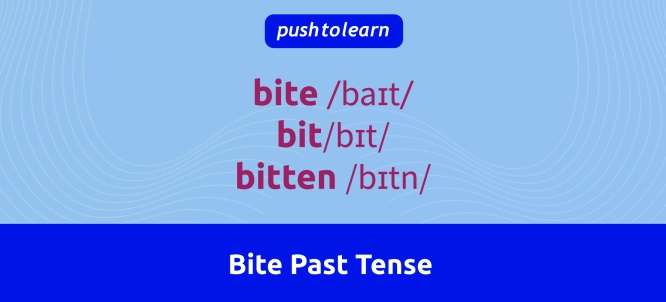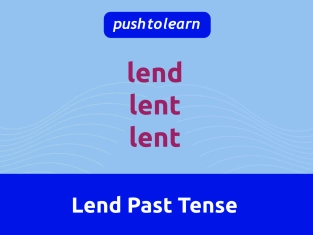by PushtoLearn
Bite Past Tense
Table of Contents
Bite Past Forms - Exercises
These exercises test different forms of the verb BITE and IRREGULAR VERBS
Meaning
The verb "bite" means to use your teeth to cut, crush, or chew somethingIn English, the past tense of "bite" is "bit". We use this form to describe an action that took place in the past and is now complete. There is also a past participle form, "bitten," which is used with helping verbs like "have," "has," or "had."
-
Present: bite
-
Past: bit
-
Past Participle: bitten
-
Present Participle: biting
Examples:
- Present: "I bite into an apple every day."
- Past: "Yesterday, I bit into an apple."
- Past Participle: "I have bitten into an apple before."

Rules for Using "Bite" in Past Tense
-
Use "bit" for simple past tense when talking about a completed action.
-
Example: "The dog bit the mailman yesterday."
-
Use "bitten" as the past participle with helping verbs to form perfect tenses.
-
Example: "She has bitten her lip many times before."
Here are some sentences to show how to use "bit" correctly:
-
Simple Past: "The child bit his finger while eating."
-
Simple Past: "Yesterday, I bit into an orange and it was sour."
Using "bitten" requires a helping verb to make the sentence grammatically correct:
-
Present Perfect: "I have bitten my tongue so many times this week."
-
Past Perfect: "By the time she arrived, the snake had bitten him twice."
Common Mistakes with "Bite"
-
Mistake: Using "bitten" instead of "bit" in the simple past
-
Incorrect: "Yesterday, I bitten my tongue."
-
Correct: "Yesterday, I bit my tongue."
-
Mistake: Adding "-ed" to form "bited"
-
Incorrect: "The dog bited me."
-
Correct: "The dog bit me."
-
Mistake: Using "have bit" instead of "have bitten"
-
Incorrect: "I have bit into that type of fruit before."
-
Correct: "I have bitten into that type of fruit before."
Everyday Use of "Bite" in Conversations
In daily conversations, we often use both "bit" and "bitten" depending on the situation. For example:
-
Using "bit" for a past action: "I bit into the sandwich and found it was too spicy."
-
Using "bitten" with "have/has/had": "She has been bitten by a bee before."
Remember, "bit" is for past actions by itself, and "bitten" is used with helping verbs to express a completed action connected to the present or past.
Summary Table
|
Tense |
Example |
|
Simple Past |
"I bit into the apple." |
|
Present Perfect |
"I have bitten into an apple before." |
|
Past Perfect |
"She had bitten her lip." |
FAQ
What is the past tense of "bite"?
The past tense of "bite" is "bit".
When should I use "bitten" instead of "bit"?
Use "bitten" when you have a helping verb like "have," "has," or "had."
Is it correct to say "bited"?
No, "bited" is incorrect. The past tense of "bite" is "bit."
Can I say "have bit"?
No, you should say "have bitten" for correct grammar.
What's the difference between "bit" and "bitten"?
"Bit" is the simple past form, and "bitten" is the past participle form used with helping verbs.

